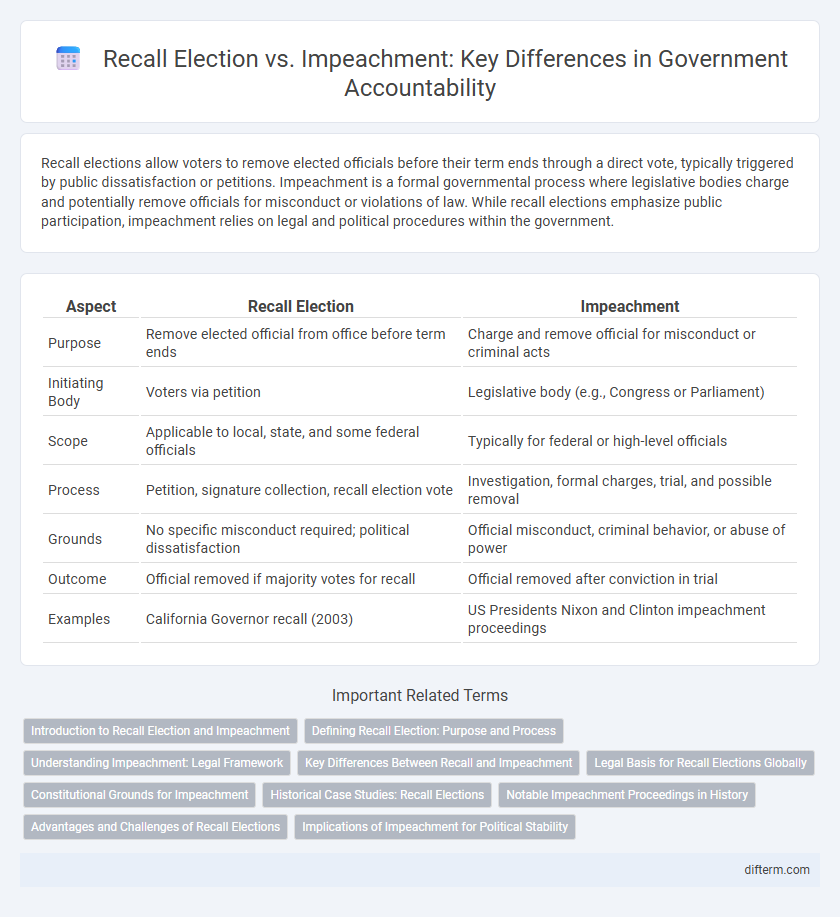Recall elections allow voters to remove elected officials before their term ends through a direct vote, typically triggered by public dissatisfaction or petitions. Impeachment is a formal governmental process where legislative bodies charge and potentially remove officials for misconduct or violations of law. While recall elections emphasize public participation, impeachment relies on legal and political procedures within the government.
Table of Comparison
| Aspect | Recall Election | Impeachment |
|---|---|---|
| Purpose | Remove elected official from office before term ends | Charge and remove official for misconduct or criminal acts |
| Initiating Body | Voters via petition | Legislative body (e.g., Congress or Parliament) |
| Scope | Applicable to local, state, and some federal officials | Typically for federal or high-level officials |
| Process | Petition, signature collection, recall election vote | Investigation, formal charges, trial, and possible removal |
| Grounds | No specific misconduct required; political dissatisfaction | Official misconduct, criminal behavior, or abuse of power |
| Outcome | Official removed if majority votes for recall | Official removed after conviction in trial |
| Examples | California Governor recall (2003) | US Presidents Nixon and Clinton impeachment proceedings |
Introduction to Recall Election and Impeachment
Recall elections allow voters to remove elected officials from office before their term ends by petition and subsequent vote, providing direct democratic control. Impeachment is a formal process conducted by a legislative body to charge and potentially remove public officials for misconduct or crimes, emphasizing legal and constitutional accountability. Both mechanisms serve as checks on government power but differ in procedure, scope, and the entities involved.
Defining Recall Election: Purpose and Process
A recall election is a procedure that allows voters to remove an elected official from office before the end of their term through a direct vote. It serves as a tool for holding public officials accountable when they are perceived to have failed in their duties or lost public trust. The process typically requires a petition with a specific number of signatures, followed by a special election where voters decide whether to retain or remove the official.
Understanding Impeachment: Legal Framework
Impeachment is a constitutional process that involves formally charging a public official, such as the president, with misconduct or criminal behavior. The legal framework for impeachment typically includes specific grounds, procedures for investigation, and a trial conducted by a legislative body, often the Senate. This process differs from recall elections, which allow voters to remove officials before the end of their term through a direct vote.
Key Differences Between Recall and Impeachment
Recall elections allow voters to remove elected officials before their term ends through a direct vote, typically triggered by petition signatures, while impeachment is a formal legislative process to charge and potentially remove officials for misconduct. Recalls often apply to a wider range of officials including governors and local representatives, whereas impeachment is usually reserved for high-ranking officials such as presidents or judges. The standards for recall focus on public dissatisfaction, while impeachment requires proof of legal or ethical violations.
Legal Basis for Recall Elections Globally
Recall elections are legally grounded in constitutional or statutory provisions that allow voters to remove elected officials before the end of their term, with notable examples in the United States, the Philippines, and Switzerland. These laws typically require petition thresholds ranging from 10% to 25% of the electorate to initiate the process, reflecting varying degrees of direct democratic control worldwide. Impeachment, in contrast, is a judicial or legislative procedure based on allegations of misconduct, bounded by legal frameworks that differ significantly from the citizen-driven mechanisms of recall elections.
Constitutional Grounds for Impeachment
Recall election permits voters to remove elected officials before their term ends through a direct vote, often based on dissatisfaction with performance, while impeachment is a constitutional process targeting serious misconduct such as treason, bribery, or high crimes and misdemeanors as defined in Article II, Section 4 of the U.S. Constitution. Impeachment requires formal charges by the House of Representatives and a trial in the Senate, emphasizing legal and constitutional grounds rather than popular opinion. This distinction ensures that impeachment addresses violations of law and public trust, whereas recall elections reflect voter sentiment and political accountability.
Historical Case Studies: Recall Elections
Recall elections have been used as a direct democratic tool in various U.S. states, allowing voters to remove elected officials before the end of their term. Notable historical cases include California's 2003 recall of Governor Gray Davis, which led to Arnold Schwarzenegger's governorship. These elections highlight the political and legal complexities inherent in balancing accountability with governmental stability.
Notable Impeachment Proceedings in History
Notable impeachment proceedings in history include the cases of Andrew Johnson in 1868, Bill Clinton in 1998, and Donald Trump in 2019 and 2021, each reflecting significant political and legal challenges within government. Unlike recall elections, which allow voters to remove officials before term completion, impeachment is a formal charge initiated by the legislature for misconduct. Impeachment proceedings typically focus on violations such as abuse of power, bribery, or treason, emphasizing constitutional processes over direct voter intervention.
Advantages and Challenges of Recall Elections
Recall elections empower voters to remove elected officials before the end of their terms, enhancing democratic accountability and responsiveness. They provide a direct mechanism for citizens to address misconduct or poor performance without waiting for regular election cycles. Challenges include high costs, potential political instability, and the risk of misuse for partisan gains, which can undermine government continuity and effectiveness.
Implications of Impeachment for Political Stability
Impeachment processes can significantly impact political stability by intensifying partisan divisions and undermining public trust in government institutions. The removal of a high-ranking official through impeachment may lead to power vacuums and disrupt administrative continuity, affecting governance efficiency. However, it also serves as a constitutional mechanism for accountability, reinforcing the rule of law in democratic systems.
recall election vs impeachment Infographic

 difterm.com
difterm.com